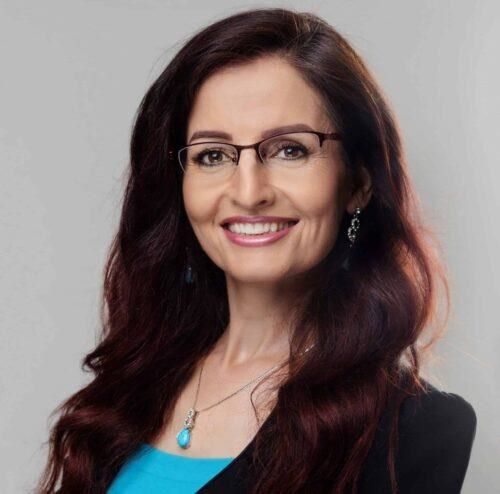In November 2021, she learned that a cousin back home in Syria received a breast cancer diagnosis. This was the second diagnosis on Mustafa’s mother’s side of the family.
Mustafa contacted her doctor for an appointment.
During her November appointment, Mustafa’s doctor found a lump and ordered a mammogram.
She had her mammogram in February and a biopsy after that.
Her official diagnosis was triple positive breast cancer.
Triple positive breast cancer has higher than usual levels of the HER2 protein, and also tests positive for estrogen and progesterone receptors.
“My doctor told me it’s a very aggressive form of cancer,” she said. “I told him I needed time to tell my family and collect myself. He said no, you need to start chemo.”
When she did begin chemotherapy, hair loss associated with the treatments followed.
Her hair started to thin after the first treatment.
But the chemo took a larger toll on her hair after the second treatment.
“I was in the shower, and it became like a broom attached to my head,” she said.
She went to a hairdresser to try to save whatever hair she could.
Those results lasted a few weeks before Mustafa made the decision to shave the rest of her hair off. She also lost her eyebrows and eyelashes.
She loved her long hair and what it represented.
“My hair falling out was the most traumatic experience,” she said. “I’ve always had long hair and my hair was part of my identity. My partner loved my hair and people complimented me on my long hair. I was very attached to it. I looked into cold capping and anything I could to try to save my hair.”
The chemotherapy also made her feel ill.
Mustafa vomited after the first treatment and had to change her diet to ensure she continued to intake calories.
“Water started to taste like metal,” she said. “My diet became very light in fat, lots of olive oil, some bread and a little bit of eggs or meat.”
The way Mustafa felt during chemo went in a circle.
She’d have treatment, need time to recover, and would start feeling better before the cycle started again.
She tried to remain active on days she felt up for it.
“No matter how tired I was, if I could walk for 10 minutes, I would do it,” she said. “Or I’d clean a little bit or make meals for my two kids.”

Rana Mustafa (Global Institute for Food Security photo).
In addition, Mustafa found opportunity during her breast cancer treatments.
She took courses and became a coach to provide support for other women going through breast cancer.
“I’d be at the hospital for chemo and taking online courses,” she said. “With coaching, not only did it allow me to help other women, but I also proved to myself that I still have something to offer. It helped so much because I felt isolated at the beginning.”
After finishing her chemotherapy treatments, Mustafa had surgery in September 2022.
She chose to have a single mastectomy with expanders put in for reconstruction.
In March 2023, surgeons removed the expanders to allow for an implant to be put in.
When Mustafa sees herself in the mirror now, she sees short curly hair growing back and other physical evidence of her journey with breast cancer.
It’s a difficult image to see, she says.
“It’s hard to accept that new reality,” she said. “I try not to dwell on it but I’m not the same person my partner met because my body is different. He’s very supporting in showing me that he loves me, the essence of who I am. That was a very important part of my healing process.”
While going through her breast cancer journey, Mustafa reminded herself of how much strength she’s shown in the past.
She fled war in Syria, moved to France on her own to continue her education, and moved again to Canada.
The universe works in mysterious ways, she says.
“When the cancer came, I’d say ‘why me?’” she said. “And then a book I read talked about universal signals and how to grab them. The question now becomes ‘why not me?’ My story can become the survival guide for someone else.”